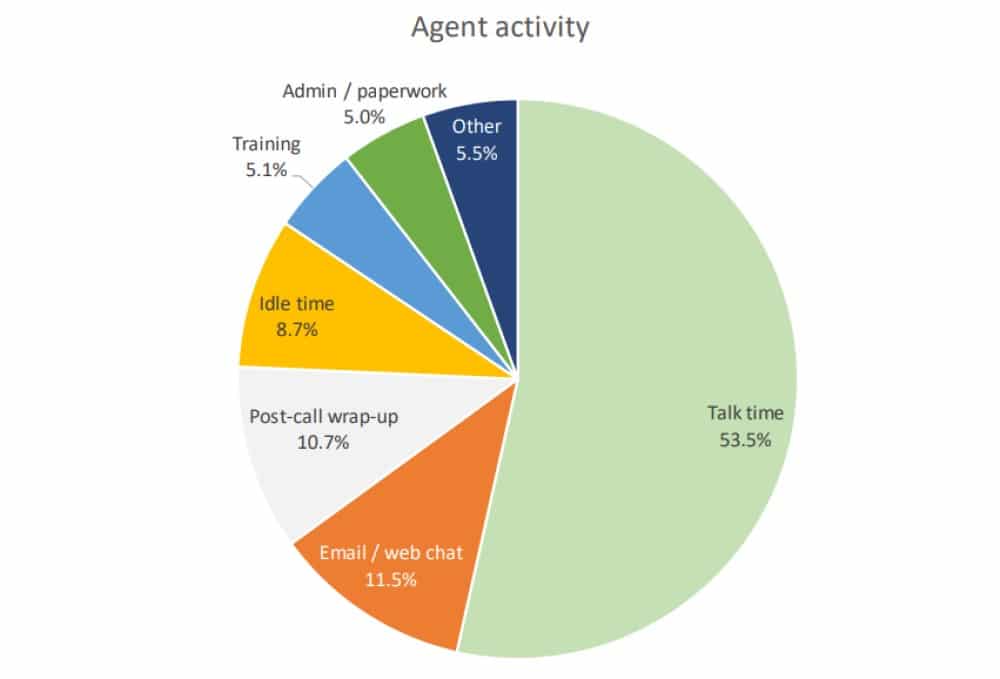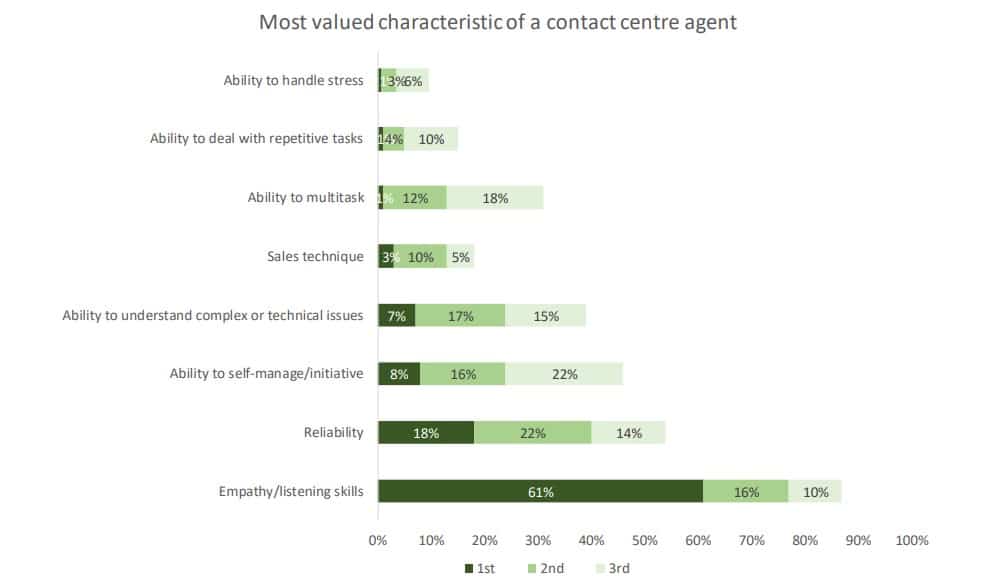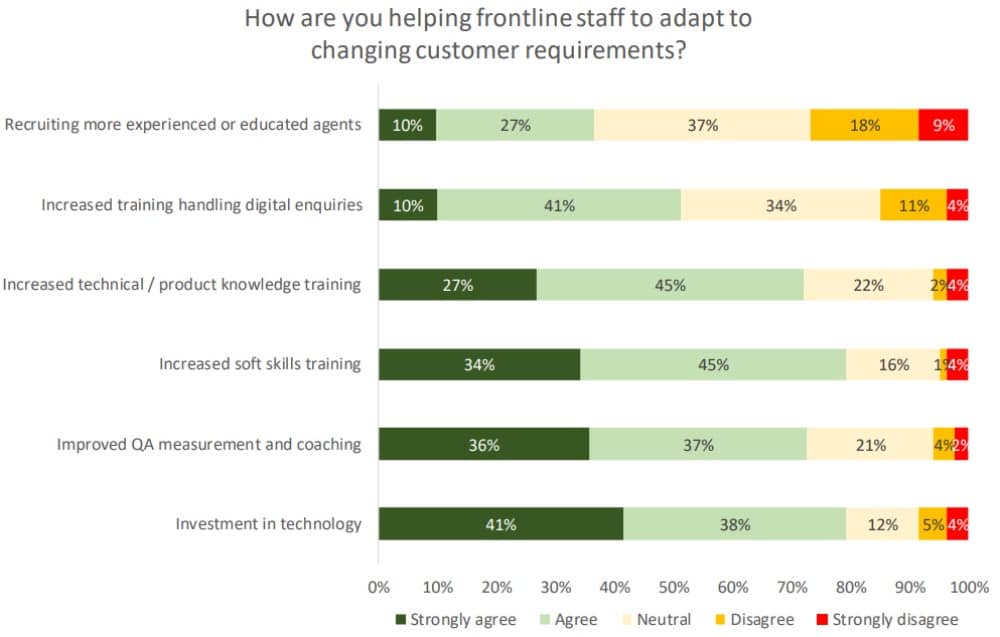The most recent posts in our contact centres series put HR in the niche under the microscope. We studied staff retention and what centres do to tackle high turnover. Then, we examined how managers track employee satisfaction and seek to boost morale.
There’s one more crucial element of contact centre HR left to explore. In this post, you’ll get an insight into staff training and how firms get agents ready to deliver superior customer experience. We’ll look at the different aspects of agent training and how businesses in the niche approach it.
Contact centres are rapidly evolving entities. Changing customer demands and new tech are continually impacting agents’ roles. We’re also going to dig into that topic. Mainly, we’ll focus on the unique challenges it creates as regards staff training. So, let’s get started.
Training Contact Centre Teams
A modern contact centre agent is likely to respond to queries via a multitude of channels. The sheer variety of questions they could get asked is almost endless. Training helps agents prepare how to manage the different channels and handle questions. It is vital to the smooth operation of a contact centre.

Source: Contact Babel
Contact Babel recently carried out an exhaustive industry study. They found that around 5% of an agent’s time, on average, is spent training. That’s regardless of how experienced they are or how long they’ve been on the job. What, then, makes extensive and ongoing training so necessary in the niche? There are three principal factors:
- Knowledge-based training
- Soft skills (communication, empathy, etc.)
- Culture & systems specific to a contact centre
Knowledge & Expertise
As we covered in an earlier post, much of an agent’s role consists of answering inbound queries. Such communications from customers fall into a few general categories. They may be complaints, questions about products, or queries about a firm or brand.
So that an agent can answer any such enquiry, they need a vast pool of knowledge. Systems and software solutions can help deliver some information. Customers, though, expect agents to understand what they’re asked and know how to address an issue.
Training agents to this level of expertise is not an easy task. That’s especially true in outsourced contact centres. In those organisations, agents may offer customer support for different brands each day. They need knowledge of all those brands and their products.
Human & Communication Skills
In-depth product and systemic knowledge are far from all you need to be a skilled contact centre agent. There is also a range of so-called soft skills that are invaluable. These are the general human skills that enable advisors to offer a superior level of service. Two such necessary skills for agents are the ability to listen and empathise.

Source: Contact Babel
Most centre operators see empathy and listening skills as an agent’s most valued characteristics. Customers who reach out to a centre are often frustrated or have suffered a problem. Someone at the other end of the phone or another channel who listens and understands is critical. Teaching and developing soft skills is another essential element of contact centre training.
Company Culture & Specific Systems
When we talked about team building in contact centres we touched on onboarding. That’s the process of bringing new staff into a new firm and assimilating them successfully. There’s clearly a lot of training involved in onboarding. A significant part of that is teaching new agents company systems and culture.
Every agent must understand the software and platforms used in the contact centre. They also must learn and buy into the company culture if they’re going to be engaged, productive workers. This element of staff training isn’t only for new workers, though. Any changes to systems necessitate further training for existing workers. It can also be useful for all staff to get occasional refreshers on company culture and principles.
FM Outsource – A Case Study
We’ve been lucky enough to speak to a range of industry pros when creating this series. When we chatted with FM Outsource, they shared an in-depth picture of staff training at the business.
Learning and development for agents at FM Outsource gets split into two categories. Those are’ advisor training’ and ‘campaign training’. Advisor training is the part of the process that applies most to new employees. It’s where FM Outsource teaches workers the company culture and the central skills needed to be an agent.
New agents at the firm start out in the classroom. They then move on to a more comprehensive stage of learning and development. Progress through these stages gets tracked on new advisor scorecards.
When they’re ready, new advisors then graduate to the company’s live system, albeit on a limited basis. They handle a smaller number of contacts in a dedicated area of the contact centre. A trainer is always close at hand and gives the new agents the confidence that they have support if needed.
Campaign training is the ongoing instruction that all FM Outsource agents receive. It’s the process by which they get taught the product and brand-specific details for each of the firm’s clients. Depending on the client, this can be via handbooks or a dedicated on-site course. Campaign training is how FM Outsource staff get the expertise needed to do their jobs.
New Training Challenges in an Evolving Niche
What customers require of contact centres is changing. New consumer demands increasingly drive the service such organisations provide. Firms are adapting to deliver the customer experience that’s now expected. The need for such adaptation means many centres are choosing to offer a more considerable amount of higher quality training.

Source: Contact Babel
There are three main ways in which trends within the contact centre niche are impacting training:
- Helping agents deal with omnichannel
- Need for improved technical expertise
- The relationship between technology and training
Handling More Channels
The move toward omnichannel support is one of the most significant trends in the contact centre niche. Customers want varied ways to converse with companies. Contact centres, too, benefit in terms of productivity by introducing new channels. New means of communication, though, make broader training essential.
Modern contact centre agents must know how to use every channel their centre offers. They’ll also need to be proficient in moving between them and drawing info from each. That kind of proficiency can only come from training. It makes staff development in the niche more critical.
Developments at Cymphony show an increased awareness of how essential training now is. Marketing Manager, David Rolf, told us that the firm has now hired a company trainer. For the first time, Cymphony has made training a separate function in the business. Before, agent education and instruction got handled by line managers.
Integration & Other Aspects Related to Omnichannel
As you’ll know if you read our post on the subject, omnichannel support isn’t only about adding new channels. It also involves creating a unified interface. That interface must handle not only every channel but also other related systems. Truly integrated centres have a coherent path for data through many diverse systems.

Source: Call Centre Helper
The number of systems any one centre may use is extraordinary. Cymphony, for instance, deals with more than 50 customer relationship management (CRM) applications. Different clients of the centre use different solutions. Cymphony agents must work across all of them. Training staff to use many systems, then, is another challenge for a modern contact centre.
A Different Perspective on Tech & Staff Training
Look back at the graph a little higher up the page. You’ll see that it’s not only different types of training that contact centres use to support their staff. Lots of firms also reported investing in tech to help agents deliver what’s expected of them.
When you talk tech in the contact centre niche, the mind naturally wanders to chatbots and AI. As we covered earlier in this series, though, new tech that’s disrupting the niche is far more varied than that. Developments in areas like robotic process automation (RPA), what’s more, also effect training.
RPA takes repetitive, time-consuming tasks away from agents. Tech can do that legwork instead, freeing up agents for jobs that need human intelligence. By extension, advisors also won’t need training in those tasks. Instead, more valuable training time can get spent on honing soft skills.
Staff Training – How Contact Centres Keep Agents at the Cutting-Edge
A contact centre’s agents are their most precious resource. It’s the frontline workers who deliver the superior experience customers now expect. Operators must give agents the best chance of providing that cutting-edge service. That makes staff training crucial.
Learning and development for agents have always been essential. Advisors must blend product knowledge and personal skills to serve consumers best. Recent changes in the contact centre niche have made training even more invaluable.
New tech and changing customer demand are seeing the industry evolve apace. Agents must be skilled and agile enough to respond. Training that aids them in handling multiple channels is one notable trend. Beyond that, technical training to help them navigate complex, integrated systems is also on the rise. These trends are both driven and supported by new technology.
Agents must learn to wield new solutions that are now part of their day-to-day activities. Other technology, meanwhile, takes burdens away from agents. That gives them more time to develop their soft skills. Such nuanced changes will contribute to the changing face of the niche in the coming years. Precisely what shape the sector and firms within it will adopt in the future is up for debate. It’s also the subject of the next – and final – post in this series.
Originally published May 26, 2021, updated Jan 16, 2023
